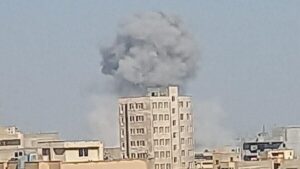Tehran’s Foreign Ministry spokesman calls on world to halt fighting as Israeli expert estimates military pressure worries the regime trying to project power against external threats

As senior Iranian military and Islamic Revolutionary Guard Corps (IRGC) commanders continue issuing threats and launching missile attacks against Israel, Iranian Foreign Ministry spokesman Esmail Baghaei called on Tuesday for urgent international action to halt the escalating war with Israel.
“We emphasize the need for immediate international and regional steps to stop the war that has been imposed on Iran,” Baghaei said. His remarks came as Iran’s Fars News Agency quoted ground forces commander Kiyumars Heidari threatening a “new wave of attacks that will intensify in the coming hours.”
The statement followed the Israeli assassination of Iran’s newly appointed “wartime chief of staff,” named in an emergency after the deaths of Iran’s top military and IRGC leaders. Israel has also succeeded in disrupting Iranian missile launches and has reportedly secured complete freedom of operation in Tehran’s airspace.
Dr. Raz Zimmt, head of the Iran program at Tel Aviv University’s Institute for National Security Studies (INSS), cited an editorial in the Iranian reformist daily Shargh warning that Iran’s national security now hinges on ending the fighting as soon as possible.
“While Israel has virtually unlimited resources due to its ties with global powers and access to advanced weapons, no country has endless resources,” the paper said. “Iran must preserve its strength to deter neighboring countries seeking to weaken or fragment it. The fighting must stop and national resources should be redirected toward internal economic development.”
Shargh added that this isn’t a traditional military conflict requiring ground troops but one shaped by physical distance and driven largely by technology. “We must not ignore the central role that technological tools—especially artificial intelligence—play in this war. Awareness of these limitations should push us to exit the combat cycle as quickly as possible,” the paper read.
Meanwhile, U.S. President Donald Trump sent mixed messages overnight regarding a possible ceasefire. On the one hand, he urged residents of Tehran to “evacuate immediately” and left the G7 summit claiming to be working on “something big”—though he insisted it wasn’t a ceasefire.
On the other hand, he signed a declaration backing Israel and urging steps to prevent further escalation. According to journalist Nadav Eyal, advanced negotiations are underway for a potential hostage deal and an end to the war in Gaza.
In Israel, Foreign Minister Gideon Sa’ar addressed the Knesset Foreign Affairs and Defense Committee on Tuesday morning at the start of a closed briefing. Speaking on the diplomatic front, Sa’ar noted Iran’s recent efforts: “Yesterday, the IAEA convened a meeting at Iran’s request and at Russia’s initiative to discuss Israel’s strike on Iranian nuclear facilities. That meeting ended without any outcome against Israel,” he said.